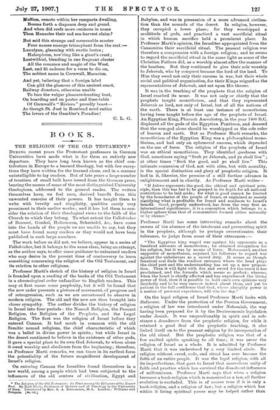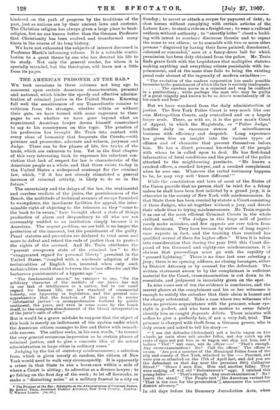BOOKS.
THE RELIGION OF THE OLD TESTAMENT.* DURING recent years the Protestant professors in German Universities have made what is for them an entirely new departure. They have long been known as the chief con- tributors in Europe to a learned theology, but with few excep- tions they have written for the learned alone, and in a manner unintelligible to lay readers. But of late years a large number of treatises of small bulk have issued from the German press, bearing the names of some of the most distinguished University theologians, addressed to the general reader. The writers themselves have, we feel sure, derived benefit from this unwonted exercise of their powers. It has taught them to write with brevity and simplicity, qualities rarely very prominent in their earlier works ; and it has led them to con- sider the relation of their theological views to the faith of the Church to which they belong. To what extent the Vollesbicher of Bousset, Gunkel, Boltzmann, Schmiedel, &c., have come into the hands of the people we are unable to say, but they must have found many readers or they would not have been published in such large numbers.
The work before us did not, we believe, appear in a series of Volksbiicher, but it belongs to the same class, being an attempt, as the author says, to offer some guidance to unlearned readers who may desire in the present time of controversy to learn something concerning the religion of the Old Testament, and its relation to other religions.
Professor lltiarti's sketch of the history of religion in Israel is founded upon a reading of the books of the Old Testament in a chronological order unfamiliar to English readers. This may at first cause some perplexity, but it will be found that the new order presents a picture of movement, of progress and of retrogression, such as we are accustomed to observe in modern religion. The old and the new are thus brought into closer sympathy. The author divides the history of religion in Israel into four periods : the Nomad Religion, the Peasant Religion, the Religion of the Prophets, and the Legal Religion. The first was the religion of Israel before they entered Canaan. It had much in common with the old Semitic nomad religions, the chief characteristic of which was a belief in divine power in spirits ; but while Israel in the desert Continued to believe in the existence of other gods, it gave a special place to its own God Jehovah, to whom alone it owed worship and obedience from the beginning ; therefore, as Professor Marti remarks, we can trace in its earliest form the potentiality of the future magnificent development of Israel's religion.
On entering Canaan the Israelites found themselves in a new world, among a people which had been subjected to the influences of the old centres of civilisation, Egypt and
* The Religion of the Old Testament its Place among the Religions of the Nearer East. By Karl Marti, Professor of Hebrew and of Theology in the University of Bern. Translated by Rev. S. A. Bienemann, M.A. London : Williams and Norgate. De. 6d..1
Babylon, and was in possession of a more advanced civilisa- tion than the nomads of the desert. In religion, however, they occupied a lower place; for they worshipped a multitude of gods, and practised a vast sacrificial ritual in which human sacrifice held a prominent place. In Professor Marti's opinion, the Israelites appropriated from the Canaanites their sacrificial ritual. The peasant religion was therefore a compromise with a foreign religion; and he seems to regard the sacrificial ritual in the same light as some of the Christian Fathers did, as a worship almost after the manner of the heathen. But they continued to give their sole worship to Jehovah, who by conquest became the lord of the land. To Him they owed not only their success in war, but their whole social and political organisation, for their Kings reigned as the representatives of Jehovah, and sat upon His throne.
It was in the teaching of the prophets that the religion of Israel reached its acme. It was not only or chiefly that the prophets taught monotheism, and that they represented Jehovah as lord, not only of Israel, but of all the nations of the earth. There is at least one instance of monotheism having been taught before the age of the prophets of Israel. An Egyptian King, Pharaoh Amenhotep, in the year 1400 B.C.
displaced all the gods of the Egyptian Pantheon, and decreed that the sun-god alone should be worshipped as the sole ruler of heaven and earth. But as Professor Marti remarks, the monotheism of the Egyptian King was a philosophical mono- theism, and had only an ephemeral success, which depended on the use of force. The religion of the prophets of Israel was an ethical monotheism. They identified goodness with God, sometimes saying "Seek ye Jehovah, and ye shall live " ; at other times "Seek the good, and ye shall live." This intimate connexion of God, not with rites, but with morality, is the special distinction and glory of prophetic religion. It
had in it, likewise, the promise of a still further advance in enlightenment and in charity. As Professor Marti writes— "If Jahwe represents the good, the ethical and spiritual prin- ciple, then this has but to be grasped in its depth for all national restrictions to be laid aside ; for what is good cannot be limited by the boundaries of the people of Israel, or explained as merely signifying what is profitable for Israel and conduces to Israel's benefit. Good, properly understood, has from the very first an international significance; it is a conception which belongs to a higher sphere than that of communities formed either naturally or by chance."
Professor Marti has some interesting remarks about the causes of the absence of the intolerant and persecuting spirit in the prophets, although be perhaps overestimates their tolerance, to judge from some of their utterances :—
"The Egyptian king waged war against his opponents as a fanatical advocate of monotheism ; he obtained recognition for his religion, but it was by means of force. Mohammed, another supporter of monotheism, enjoined his followers to regard war against the unbelievers as a sacred duty. It seems as though fanatical zeal finds the readiest entrance where the head plays the chief part and the understanding has set up a new proposi- tion. Then it will fight with fire and sword for the creed it has proclaimed, and the formula which seems so perfect; whereas, when the heart is chiefly affected and has experienced the living power of God, then it is possible to hold one's own opinions very decidedly and to be very earnest indeed about them, and yet be patient in the full confidence that God, whose almighty power is a matter of personal experience, will win the day."
On the legal religion of Israel Professor Marti looks with disfavour. Under the protection of the Persian Government, a religion of law was introduced under Nehemiah, the way having been prepared for it by the Deuteronomic legislation under Josiah. It was unquestionably in spirit and in sub- stance a decadence from the prophetic religion, for while it retained a good deal of the prophetic teaching, it also linked itself on to the peasant religion by its incorporation of the old ritual. But the prophetic religion was that of a few exalted spirits speaking to all time ; it was never the religion of Israel as a whole. It is admitted by Professor Marti that it was understood by a very limited circle. No religion without creed, code, and ritual has ever become the faith of an entire people. It was the legal religion, with all its imperfections, that gave to Israel that marvellous unity of faith and practice which has survived the dissolvent influences of millenniums. Professor Marti says that when a religion becomes a book-religion which is conceived as a law, all further evolution is excluded. This is of course true if it is only a book-religion, and a religion of law; but a religion which has within it living spiritual power may be helped rather than hindered on the path of progress by the traditions of the past, just as nations are by their ancient laws and customs. The Christian religion has always given a large place to book. religion, but no one knows better than the German Professor that Christianity has been evolved and transformed many times in the course of its long history.
We have not exhausted the subjects of interest discussed in Professor Marti's informing volume. It is a valuable contri-. bution to a great theme by one who has devoted his life to its study. Not only the general reader, for whom it is specially intended, but the theologian, will learn not a little from its pages.







































 Previous page
Previous page